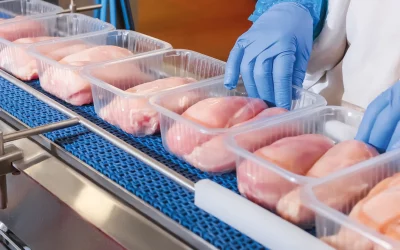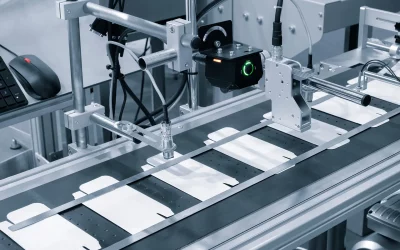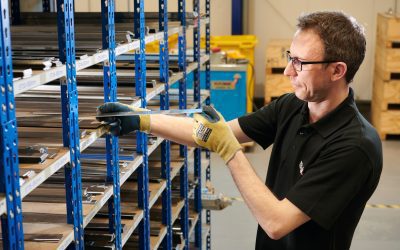In this article, we will discuss the importance of machine blades in medical packaging success and the critical factors to consider when selecting the right blades for your packaging needs.
Understanding Regulations and Standards
Medical devices and medicines must be packaged in accordance with ISO 11607-1:2020, which sets out the standards for terminally sterilised medical device packaging. This standard requires that packaging systems allow for sterilisation, provide physical protection, and maintain sterility until the point of use.
Perfect Fit with Your Machinery
To produce medical packaging that meets the exacting standards set out in ISO 11607-1:2020, the machine blades must be perfectly aligned with the machinery. Using machine blades that are not a perfect fit can lead to packaging that does not meet the required standards. At MRMK, we ensure that our blades fit perfectly with your machinery. Anything other than perfection is not accepted with us. We offer a wide range of blades for medical packaging that are perfectly adapted to specific machine types, including ULMA, Tiromat, CFS, and GEA.
Razor Sharp Blades
Medical packaging must be perfect, so you need to be able to achieve perfect cuts every time. Machine blades that are not razor-sharp can lead to imprecise cuts and packaging that does not meet the required standards. To ensure precise cuts, choose blades that are precision engineered from high-quality stainless steel (420 or 440). These blades can make the precision cuts required for medical packaging.
Types of Materials Used in Medical Packaging
The materials used in medical packaging must meet specific requirements to maintain the sterility of the product throughout its shelf-life. A variety of materials are used to create pouches, trays, and bags that contain medical devices and medicines.
Paper
Paper is used extensively in medical packaging. However, this is not any ordinary paper. Medical packaging paper is impregnated with a polymer to prevent particle contamination, which means that machine blades must be extremely sharp to cut through this type of paper.
Tyvek
Tyvek is marketed as an alternative to medical-grade paper. It is a High-Density Polyethylene (HDPE) that offers an effective barrier against microorganisms and is extremely resistant to tearing and puncturing. Machine blades such as flying knives must be extremely sharp and able to resist blunting when cutting through Tyvek.
Aluminium
Aluminium is another material that is commonly used in medical packaging. It is effective against light, oxygen, and moisture but is vulnerable to pinholes and flex-cracking. As such, it requires the use of protective layers in medical packaging contexts and a dedicated heat seal layer if it is to be used in heat-sealed packaging.
Plastic
Plastic is ubiquitous in medical packaging, used to form trays or combined with other materials to form packets. Plastics that are typically used for medical packaging include LLDPE, PP, PET, HIPS, and vinyl. Choosing the correct machine blades for cutting plastic is essential to ensure precise cuts.
Folding Cartons
Folding cartons provide additional protection and serve as a platform to place important on-pack warnings, information, and instructions. When using folding cartons as part of your medical packaging process, it is essential to have appropriate blades and print parts.
Choosing the Right Industrial Blade Manufacturer…MRMK
When investing in industrial blades for your business, choosing the right manufacturer is critical. Industrial knife manufacturing requires extensive engineering experience across a range of materials, industries, and applications to identify the correct blade for any given need. MRMK meet high levels of standards across the manufacturing process. Here are the qualities we always deliver on:
1. Blade Materials
Choose blades that are constructed with the most durable, high-quality materials. The ideal blade materials depend on the application, but all blades need to be manufactured from materials that balance hardness and toughness.
2. Blade Types
Select an industrial knife manufacturer that can provide the correct blade profile for your application, including specialty knife designs.
3. Blade Sharpness
Choose blades that are razor sharp to ensure precise cuts and meet the required standards.
4. Reliability
Select quality machine blades that can maintain their sharpness, resist blunting, and can be quickly and easily replaced on set schedules to avoid any unplanned downtime.
5. Experience
Choose an industrial knife manufacturer with extensive engineering experience across a range of materials, industries, and applications to identify the correct blade for any given need.
6. Customisation
Select an industrial knife manufacturer that can produce custom blades to meet your specific needs.
7. Precision Engineering
Choose an industrial knife manufacturer that produces expertly engineered blades that achieve the ideal ratio of hardness to toughness.
8. Blade Coatings
Select blades with appropriate coatings to increase longevity and performance.
9. Durability
Choose blades that can withstand the rigors of the application and maintain their sharpness over time.
Customer Service
Select an industrial knife manufacturer with excellent customer service and support to ensure your needs are met throughout the process.
Get in touch today for your Medical Packaging Machine Knives
Speak to our experts about how we can produce and deliver high-quality machine knives for your custom requirements. We’ll guide you on quality, costs, materials and make sure you meet legal requirements.
Get in touch with us today and experience the MRMK difference.
Explore MRMK’s custom blade solutions now
For more machine blade buying guides, advice and information, read the MRMK News and Insights Hub…


 +44 (0) 1909 519815
+44 (0) 1909 519815 


